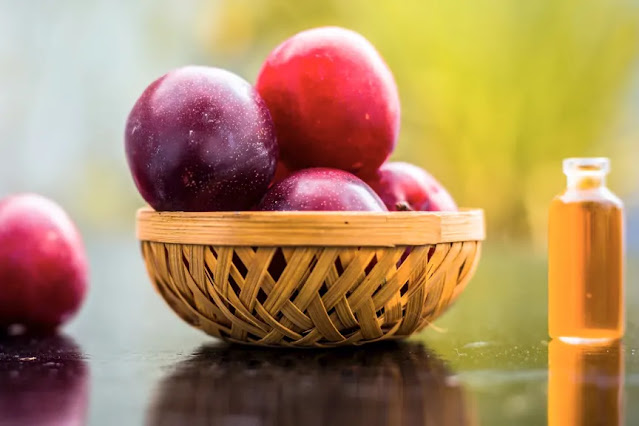Plum oil is a special oil from southwestern France. Pressed Plum Kernel by Agen Plum Oil is a cold-pressed cosmetic oil derived from the kernels of French plums. Cold pressed virgin plum kernel oil (Ente Plum), first cold pressed plum kernel oil from France. its uses for personal care and nutritional benefits.
Plum oil is primarily used for the face, although it can also work well on the neck and skin. neckline. Beauty Inside - The Facts This is a successful formula for skin care companies, combining the good image of the plum fruit with some special characteristics regarding the fatty acid composition of the plum oil. In advance, under the guidance of cosmetic dermatologists, we will tell you everything you need to know about plum oil as a powerful skin care ingredient.
Benefits Of Plum Kernel Oil In Daily Use :
Medical Use Of Plum Oil :
The powerful emollient plum seed oil was valued for its rapid penetration into the skin and could be used in a wide range of personal care and beauty products, including moisturizers, anti-aging products, body lotions, even leave-in hair serums and conditioners. Plum seed oil is also highly valued in cosmeceuticals for its promising benefits in terms of moisture protection, cell membranes, and skin elasticity. Plum oil has a number of skin benefits for such a lightweight oil, making plum oil a nutrient-rich daily treatment that can be used under heavier creams or serums.
Hair Protection :
It can also be used on the ends of wet hair to provide extra moisture and protection from heat damage. For moisturizing, nourishing and protecting hair and skin health. It is a rich oil that creates a non-greasy, silky feel on the skin when used at 1% to 10%, hydrates the skin and adds shine to the hair.
Rich In Oleic & Linoleic Acids :
Its delicious aroma is an added bonus and makes this deliciously intoxicating almond scent a great oil to give as a gift or for daily personal use. Nourishing, especially rich in oleic and linoleic acids, the oil strengthens the lipid barrier of the skin and tones the epidermis. The delightful fragrance is mild enough to blend well with other oils, providing a thin layer of lubrication and protection against moisture loss.
Use In Cosmetics :
Plum oil is used in cosmetic creams and skin lotions, especially as a general moisturizer and conditioner for dry, mature skin. Debra Jaliman points out that plum oil is often found in elixirs containing pomegranate seed oil and sea buckthorn oil, which are also lightweight, antioxidant-rich oils that don't clog pores and stimulate cell turnover for a smoother complexion.
Rich In Omega Fatty Acids :
Plum oil is rich in nourishing omega fatty acids (13 different types to be exact) and vitamins A and E, which heal and moisturize dry skin, hair and nails better than any other oil available. Organic plum oil rejuvenates skin cells thanks to its high content of sterols, fatty acids and tocopherols, which are a bioavailable complex of natural oils with vitamin E.
Skin Protective Function :
Rich in polyunsaturated essential fatty acids, linoleic acid, plum oil is used for the most sensitive skin: eczema, psoriasis, acne and sunburn. Plum seed oil is known to support the skin's protective function by slowing down or preventing free radical damage that can contribute to visible signs of aging such as wrinkles, crow's feet, age spots, sagging texture and loss of skin radiance. Plum oil is rich in tocopherols and tocotrienols, phytosterols, palmitic acid, stearic acid, oleic acid, so it treats dry/chapped/chapped/chapped skin.
Antioxidant Properties :
Plums have also been harvested for use in skin and hair care due to the powerful concentration of antioxidants in the oil. In addition to the moisturizing and antioxidant properties of plum seed oils, rosemary and pink geranium oils are known to help lighten dark circles due to their anti-inflammatory properties, while lavender essential oil helps to soothe and gently deflate tired eyes. from lack of sleep. The light texture of virgin plum oil, fast absorption and delicate fruity-almond aroma complement the best specialty cosmetics and beauty products.
The Process Of Making Oil :
During the cold pressing process, plum raw materials are compressed under high pressure, which results in the removal or release of natural oils without the use of heat or chemicals. Although the oil yield from oil cake pressing is usually not as high as compared to other methods such as solvent extraction, yields in particular for plum pits can exceed 50%.
Conclusion :
I knew that a delicious carrier oil was just what I needed to add to my daily skincare routine. I included this oil in our basic sunscreen to give your skin that extra hydration in your daily sunscreen. Plum seed oil is naturally rich in oleic acid, which is important for hydration; rich in vitamins A and E - two antioxidants "really resonate with consumers today"; and it had a great story because it was a zero waste ingredient, he said.

Comments